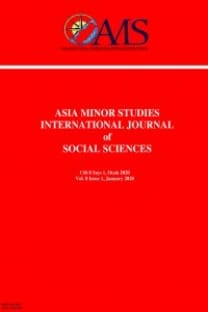AN EVALUATION ON HISTORY-MEMOIRS RELATIONSHIP IN ACADEMIC HISTORY STUDIES
History, Memoirs, Social Sciences, Events and Facts
___
Akar, Ş. K- İrfan Karakoç (2004). “Siyasi Tarih Kaynağı Olarak Hatırat ve Gezi Notları”, Türkiye Araştırmaları Literatür Dergisi, C.2, S.1, ss 383-421.Altınova, B. (2003). “Kavram Kargaşası Çerçevesinde Edebi Bir Tür Olarak “Hatıra”, Türkbilig, Sayfa Aralığı 3-12.
Altıkulaç, A- Emine Güntepe Yeşilbursa (2014). “Tarih Araştırmacılarına Göre Hatıratların Tarihsel Değeri”, ISHE.
Bernheim E. (1936). Tarih İlmine Giriş, Tarih Metodu ve Felsefesi, Çev.:M.Şükrü Akkaya, İstanbul: Kültür Bakanlığı Yayınları.
Birinci, A. (1998). “Hatırat Türünden Kaynakların Tarihi Araştırmalardaki Yeri ve Değeri”, Atatürk Araştırma Merkezi Dergisi, Sayı: 41.
Bloch, M. (1985). Tarih Savunusu Ya Da Tarihçilik Meselesi, Çev.: Mehmet Ali Kılıçbay, Ankara: Birey ve Toplum Yayınları.
Burke, P. (2002). Fransız Tarih Devrimi: Annales Okulu, Çev.: Mehmet Küçük, Ankara: Doğu-Batı Yayınları.
Burke, B- Febvre v.d. (2007). Tarih ve Tarihçi Annales Okulu İzinde, Der.:Ali Boratav, Kırmızı Yayınları, İstanbul.
Collıngwood, R.G. (1990). Tarih Tasarımı, Çev.: Kurtuluş Dinçer, Ara Yayınları, İstanbul. Buhr, M- W Schroeder- K Barck (2006). Aydınlanma Felsefesi, Çev.: Veysel Atayman, İstanbul: Yenihayat Yayınları.
Connerton, p.(1999). Toplumlar Nasıl Anımsar, Çev.:Alaeddin Şenel, İstanbul: Ayrıntı Yayınları.
Çukurova, B. (1999). “Milli Mücadele Anıları Üzerine Bir Bibliyografya Denemesi 1”, Ankara Üniversitesi Türk İnkılâp Tarihi Enstitüsü Atatürk Yolu Dergisi, VI/23. Demirtaş, B. (2017). “Tarih Yazımında Hatırat ve Günlüklerin Yeri ve I.Dünya Savaşında Kafkas Cephesi Örneği”, Tarih ve Gelecek Dergisi, C.3, Sayı 1.
Gulbenkıan Komisyonu. (1996). Sosyal Bilimleri Açın, İstanbul: Metis Yayınları.
Halkın, L. E. (1989). Tarih Tenkidinin Unsurları, Çev.: Bahaeddin Yediyıldız, Ankara: Türk Tarih Kurumu Yayınları.
Hanilçe, M. (2008). “İkinci Meşrutiyet Dönemine Dair Hatırat Bibliyografyası Denemesi”, Bilig, Güz/2008, Sayı 47, Sayfa Aralığı147-166.
Iggers, G.G. (2000). Bilimsel Nesnellikten Postmodernizme Yirminci Yüzyılda Tarihyazımı, İstanbul: Tarih Vakfı Yurt Yayınları.
Jenkins, K. (1997). Tarihi Yeniden Düşünmek, Çev.. Bahadır Sina Şener, Ankara: Dost Yayınları.
Karakoç, İ. (2008). “Edebiyat Tarihi Kaynaklarından Hatıralar ve Osmanlı’dan Günümüze Edebiyat Hatıraları Bibliyografyası Üzerine Bir Deneme”, Kebikeç, Sayı 26, Ankara: Kebikeç Yayınları.
Kütükoğlu, M. (2011). Tarih Araştırmalarında Usül, II.Dizi, Sayı 6, Ankara: Türk Tarih Kurumu Yayınları.
Okay, O. (1997). “Hatırat”, İslam Ansiklopedisi, C.16, İstanbul: Diyanet Vakfı Yayınları.
Ortaylı, İ. (2007). Tarihin Sınırlarına Yolculuk, İstanbul: Timaş Yayınları.
Özçelik, İ. (2012). Tarih Araştırmalarında Yöntem ve Teknikler, Ankara: Nobel Akademik Yayıncılık.
Öztürk, B. (2011). “Tanzimat Yazarlarına Göre Hatırat Türü”, TÜBAR, XXIX.
Rchıbald, Robert R. (2007). “ A Personal History of Memory”, Social Memory and History, Edited by Jacob J.Climo and Maria G.Cattell, New York: Altamira Press.
Sander, O. (1976). “Tarihte Yöntem”, Toplum Bilimlerinde Araştırma ve Yöntem, Derleyen:Ruşen Keleş, Türkiye ve Orta Doğu Amme İdaresi Enstitüsü Yayınları, No.152, Sayfa Aralığı 183-197, Ankara: Sevinç Matbaası.
Thompson, P. (1999). Geçmişin Sesi, İstanbul: Tarih Vakfı Yurt Yayınları.
Togan, Z.V. (1950). Tarihte Usûl, İstanbul: İstanbul Üniversitesi Edebiyat Fakültesi Yayınları.
- ISSN: 2147-1673
- Yayın Aralığı: Yılda 2 Sayı
- Başlangıç: 2013
- Yayıncı: Serhat KUZUCU
Mardin'in Kaybolan Değerlerinden Yazmacılık
Naime Didem Naime ÖZ, Ayşegül KOYUNCU OKCA, Hatice Kübra UYGUR
MİMARİ TASARIMDA SU ÖĞESİNİN FARKLI KULLANIM AMAÇLARI BAKIMINDAN İNCELENMESİ: ANADOLU ÖRNEĞİ
AN EVALUATION ON HISTORY-MEMOIRS RELATIONSHIP IN ACADEMIC HISTORY STUDIES
KINA GELENEĞİ BAĞLAMINDA OLUŞAN SÖZLÜ ŞİİR ÜRÜNLERİNİN İŞLEVLERİ: GAZİANTEP ÖRNEĞİ
Yukarıköy (Çanakkale-Ayvacık) Geleneksel Yörük Dokumaları
Naime Didem ÖZ, Aysegül Koyuncu OKCA
Yeliz KINDAP TEPE, Betül DELİSER, Gülnur KUZAN, Rabia İSLAMOĞLU
GEÇMİŞTEN GÜNÜMÜZE SINIR DUVARLARI
Asli YILDIZ, Asena SOYLUK, Pelin SARICIOGLU
YEREL YÖNETİMLERDE YÖNETİŞİM UYGULAMALARI: SERİK BELEDİYESİ ÖRNEĞİ
Mustafa KOCAOĞLU, Medine FURAL
İKİ PROJE/İKİ MEDENİYET: ZİNDANKALE SANAT GALERİSİ VE AKROPOL MÜZESİ
TÜRKİYE – ÇEKOSLOVAKYA TİCARİ İLİŞKİLERİNDE SKODA SİLAH FABRİKASI (1923-1939)
